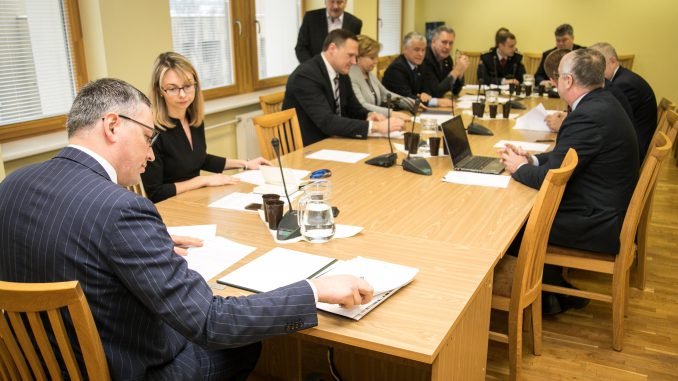
After a nine-hour meeting, the committee approved the findings with ten members voting in favor and one — Social Democratic MP Juozas Olekas — abstaining.
Here are the nine key findings and trends identified by the committee.
Rosatom‘s interests in Lithuania. Activities by Russia’s state nuclear energy corporation Rosatom are based on exerting unlawful influence on authorities and its goal is to dominate the region’s energy sector, which is incompatible with Lithuania’s efforts to secure energy independence from Russia.
Rosatom’s plans to create a consortium with Lithuanian companies and seek decisions and projects favorable to the Russian group are regarded as aimed at changing the geopolitical direction of Lithuania, which poses a threat to national security.
The Russian nuclear energy giant in 2012 to 2013 tried to carry out a plan to found a joint venture with Lithuanian companies and participate in key regional energy projects, such as building power transmission links to the Russian exclave of Kaliningrad, using the Kruonis pumped storage hydro power plant for future trade in electricity generated at power plants under construction in Belarus, and taking part in the construction of the Baltic Nuclear Power Plant in Kaliningrad and in the Ignalina Nuclear Power Plant‘s decommissioning projects, and, under favorable circumstances, in building a new nuclear power facility in Lithuania.
The committee says it has information that Rosatom is actively preparing for bidding, via Nukem, for new large-scale decommissioning projects at the Ignalina plant.
It states that Rosatom’s interests in the Ignalina plant’s decommissioning process match those of MG Baltic, one of Lithuania’s largest business groups. Mitnija, a MG Baltic company, would bag long-term building projects and Rosatom could control the closure process.
MG Baltic’s interests and methods. The business groups’ activities pose a threat to the state and national security.
MG Baltic actively interfered in political processes by exerting influence on members of political parties represented in the Seimas and in Vilnius’ local authority, and on ministers, civil servants and company managers. The group collected confidential or discrediting materials on politicians and officials with the aim of bribing, influencing and blackmailing them. MG Baltic, in many cases, used its media organizations to put pressure on politicians, civil servants and officials, according to the findings.
The business group had interests in the energy, communications, construction, healthcare and education sectors, as well as in the State Tax Inspectorate and the Prosecutor’s Office. It sought to participate in high-value projects under the control of the Center of Registers, the Emergency Response Centre and the Economy Ministry.
The Liberal Movement was created under MG Baltic’s scenario. The committee says that MG Baltic’s top executives embarked on a political scenario aimed at creating a new, Liberal party meeting the group’s interests. In less than 10 years after the establishment of the Lithuanian Liberal Movement, a political party closely associated with its top executives, MG Baltic became Lithuania’s most influential business groups.
MG Baltic sought to strengthen their non-transparent influence in the state, and certain public authorities could be regarded as being de facto controlled by the group, the committee said.
A billion litas from Lietuvos Geležinkeliai (Lithuanian Railways, LG). MG Baltic, via its media and the then Liberal Transport Minister Eligijus Masiulis, put direct pressure on LG’s management over the state railway company’s poor performance. This led to Mitnija and its partner, Kauno Tiltai (Kaunas Bridges), being awarded contracts worth more than a billion litas (EUR 300 mln) by LG between 2009 and 2013.
The Seimas committee proposes to ask the Prosecutor General’s Office to look into these contracts.
Vilniaus Prekyba’s attempt to take over energy companies. The LEO LT project was non-transparent. Shareholders and managers of Vilniaus Prekyba, another major business group, in 2006 to 2007 sought to carry out the Leo LT project and thus take control of Lithuania’s key energy sector companies. They sought to discredit, bribe or otherwise influence politicians, heads of public authorities and public figures who were opposed to the project.
Unlawful political party funding. Politicians, businesses and media people seek to circumvent the existing ban on legal entities to financially support political parties. Forms of such support include off-the-book cash payments, discounts, donations to various foundations and covert advertising.
Unlawful lobbying. The existing mechanism for declaring public and private interests is formal and it is not controlled proactively. Cases of unlawful and non-transparent lobbying, where groups of influential individuals form in the state and use their unlawful influence to push through decisions by public authorities for both personal enrichment and for increasing the profits of businesses controlled by them and are also involved in influence “trading”, pose a threat to national security.
Misuse of the media. Some business groups that own media organizations often act non-transparently, in ways that are not consistent with journalistic ethics. The media are misused to obtain decisions favorable to their owners, promote political parties or win contracts from public authorities. In some cases, these goals are achieved by spreading biased information and fake news, and by discrediting or blackmailing people.
An insecure locomotive system. A KLUB-U locomotive safety system of the Izhevsk Radio Factory that was installed at Lietuvos Geležinkeliai is not compatible with Lithuania’s national security. The factory is part of the Russian military industrial complex
An insecure airspace monitoring system. An airspace monitoring system of Russia’s Severny Zavod that was installed at the airports of Vilnius, Kaunas and Palanga is not compatible with Lithuania’s national security.
